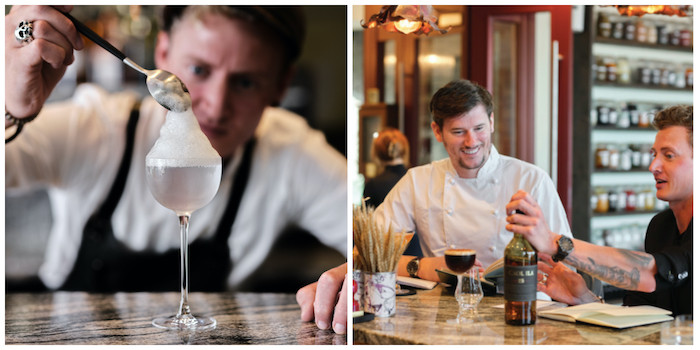
If bartending is about working with the freshest, local ingredients, rural bars have a big role to play in the future of our industry, says Ugly Butterfly’s Josh Linfitt
I’m writing this with a massive smile, watching a pod of 20 wild dolphins breaching in the Atlantic Ocean. The sun is setting on St Ives Harbour, providing a stunning purple backdrop to the final sips of my delicious local cider. I’m sat in the cocktail bar that I manage in Cornwall – Ugly Butterfly by Adam Handling.
If that doesn’t sound a lot like your workplace, for many years, it wasn’t much like mine either. I lived and breathed city bars my whole career – both in the UK and Europe – so moving back to the sleepy south west of England has been a big adjustment.
Even the concept of a rural or seaside cocktail bar – a good one, with an ambitious programme anyway – isn’t really an established thing in our industry. When I was thinking about the move I worried I’d miss my friends, the community spirit, the on-point drinks and the world-class venues of UK bar scenes, but actually, coming here, I’ve gained much more than I’ve lost.
It strikes me that rural restaurants have successfully communicated what they do – and why they should be celebrated. They’re about local sourcing, access to the freshest ingredients, a connection to the environment and its people and sustainability. I think there’s an opportunity for rural bartending to establish a similar reputation and for rural bars to be just as appealing as the best urban venues to ambitious bartenders.
It’s true that bars in big cities have access to almost every ingredient you can think of – but also true that imported produce doesn’t compare to something grown locally by loving hands that you know. And it’s not all about ingredients that are traditional or indigenous to this cool-climate area – you can find all sorts of producers in Cornwall.
People like Patrick Darcy-Evans, a niche ingredients grower based just outside of Falmouth. He has a polytunnel and land where he grows fantastic organic, tropical ingredients. We’re talking yuzu, kaffir limes and melon, along with Cornish lemons, which have a unique, rich flavour and work incredibly well in cocktails.

The hard work that Darcy-Evans puts in is completely inspiring – for Cornish lemons, for example, it’s a full 12 months from flower to fruit. The time between harvest and use is purely the time it takes to get to its buyer’s location but, given that this is a Cornish lemon that stays in Cornwall, that’s never very long at all. Knowing what goes into growing these ingredients means you don’t want to waste a scrap.
Our work at Ugly Butterfly has also seen us build a relationship with Catherine Cutler, botanist and biomes manager at the Eden Project, which has been a real honour. This relationship now enables us to harvest fruit, plants, teas, grasses and many other ingredients for the first time from biomes – ingredients that would only be available from countries on the other side of the world.
Cornish pandan, star fruit and giant passion fruit? If you don’t believe me, come down to Ugly Butterfly and try the incredible drinks and food that we have created to celebrate this hyper-local, seasonal produce. Of course, we celebrate products that are traditional to Cornwall too. The cider I’m drinking is a flat, farmhouse style pressed and fermented by our mate Cider Dave from the St Ives Cider company. We serve it chilled, out of a bag-in-a-box, poured into our wine glasses, via a carafe.
For me, this product defines our ethos of Why Waste? – a mantra which props up the three pillars of Ugly Butterfly and Adam’s restaurant and bar group as a whole. First, ‘local’ – Cider Dave grows all his organic apples and produces his cider less than 10 minutes away from the front doors of Ugly Butterfly. ‘Sustainable’ – there is zero glass used and it is made from 100% Cornish apples. ‘Luxury’ – it’s delicious, something underlined by being named the world’s best still cider at the Global Cider Awards.
When I think about what we have here, it makes me wonder how long it will be before other pioneering bar and restaurant operators and owners open their own beachside or countryside venues. When there is such great scenery, ingredients and, increasingly, talent in rural areas, bars can prosper here too.


